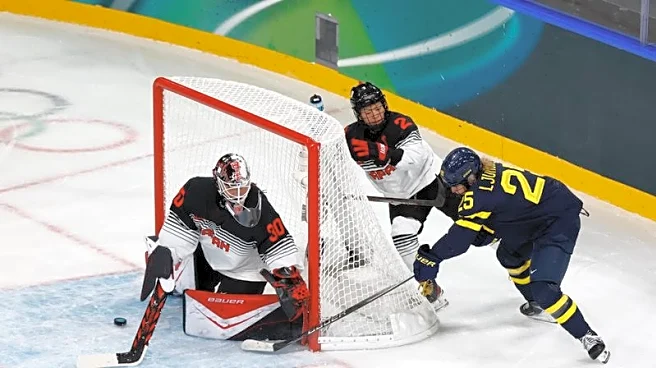Rapid Read • 9 min read
Iraq's Prime Minister Mohammed al-Sudani has implemented significant disciplinary and legal measures against senior commanders within a paramilitary force after a violent clash with police resulted in three fatalities. The incident occurred at a government facility in Baghdad's Karkh district on July 27, following the replacement of the agricultural directorate's head. An investigation revealed that the former director, implicated in corruption, had enlisted members of the Kataib Hezbollah militia to carry out the attack. Kataib Hezbollah is part of the Popular Mobilization Forces (PMF), a coalition of mostly Shiite, Iran-backed militias. The PMF, although officially under Iraqi military control since 2016, operates with considerable autonomy. The Prime Minister has ordered the removal of commanders from the 45th and 46th Brigades of the PMF, involved in the attack, and has initiated a judicial referral for all participants. Additionally, a committee has been formed to investigate leadership and control failures within the PMF.
AD
This development is significant as it highlights ongoing tensions within Iraq's security apparatus and its implications for U.S.-Iraq relations. The PMF's semi-autonomous operations and its ties to Iran-backed militias pose challenges to Iraq's sovereignty and complicate its diplomatic relations, particularly with the United States. The U.S. views some PMF factions, including Kataib Hezbollah, as terrorist organizations. The Iraqi government's efforts to integrate the PMF more closely with the military, through proposed legislation, have drawn criticism from Washington. This situation underscores the delicate balance Iraq must maintain between its internal security needs and external diplomatic pressures, especially as it navigates its relationships with both the U.S. and Iran.
The Iraqi parliament is currently debating legislation aimed at formalizing the relationship between the military and the PMF, which could further strain U.S.-Iraq relations. Prime Minister al-Sudani has defended this legislative effort as a means to ensure state control over armed groups. The outcome of this legislative process will be crucial in determining the future structure and control of Iraq's security forces. Additionally, the investigation into the PMF's leadership and control failures may lead to further reforms or restructuring within the organization, impacting its operational autonomy and its role in Iraq's security landscape.
The situation raises broader questions about the role of militias in state security and governance, particularly in countries with complex sectarian dynamics. The PMF's integration into the Iraqi military structure reflects a broader trend of state attempts to co-opt non-state armed groups, which can lead to both stabilization and new forms of conflict. The outcome of Iraq's legislative and disciplinary actions could serve as a case study for other nations grappling with similar issues.
AD
More Stories You Might Enjoy












